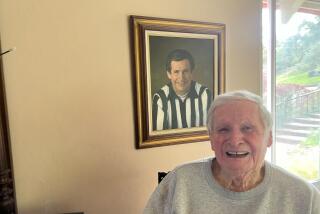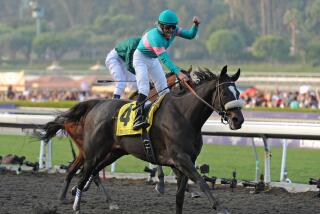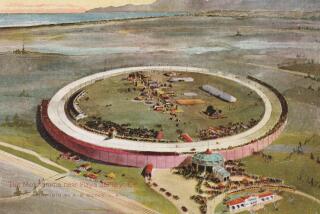Ellsworth and Tenney: 50 Years of Memories
- Share via
Hollywood Park is having its 50th anniversary, so here they are, Rex Ellsworth and Meschach (Mesh) Tenney, owner and trainer, friend and friend, side by side, neck and neck, right where they belonged, right where they happened to be half a century before.
They were here together in 1938 with, among others, a nice little homebred called Arigotal. This was not so long before the day when the movie mogul, Louie B. Mayer, beseeched Ellsworth to mind his considerable stable for him, and it was a couple of decades before a large-hearted horse named Swaps gave the partnership of Ellworth-Tenney its greatest success, while giving a kid jockey named Willie Shoemaker his first Kentucky Derby winner to boot.
Arigotal was hardly in this class, but at least looked ready and able for a 6-furlong allowance race. The rider was Silvio Coucci, who some time later would take his own life. With the admirable Johnny Adams about to be aboard Moral Victory, though, a trackside acquaintance poked Ellsworth on the shoulder and said, “There’s your winner.”
He was mistaken. The winner, led to the winner’s circle that day by Tenney, was Ellsworth’s Arigotal. It was the first of their many firsts at the Inglewood track, which was just about to end its inaugural meeting, and 50 years later, on a sunny Sunday, across the street from a fancy basketball arena that had become Hollywood Park’s neighbor, Ellsworth and Tenney were back on the premises, saddling up another promising animal.
At the entrance to the clubhouse stands a statue of Swaps, the champion that broke its maiden at Hollywood Park, then went on to break or equal six world records here. At the horse’s side, perhaps someone should consider erecting a monument to the man who owned him and the man who trained him.
They were born one day apart, Nov. 15 and 16, 1907. The well-off Ellsworths had a horse farm in Safford, Ariz., and when the Tenneys moved to town, Mesh’s mother went to work for the Ellsworths at their house. Mesh was 8 at the time, and just about everybody--not just people who raced them--traveled by horse.
“I was actually born in Old Mexico, but I lie on my license every year and say I was born in Arizona,” Tenney said. “I was born in ‘07, and when I was 5, we came through El Paso and set out for Arizona in your old-fashioned wagon train.”
Ellsworth, lunching alongside Tenney at chairman of the board Marjorie L. Everett’s table in the Turf Club, nodded at the recollection. No doubt he had heard this account of olden times before, but, what the heck, if a couple of great horsemen can’t take a stroll down memory lane, who can?
They had gotten acquainted as children, Tenney remembered, just “as soon as I got big enough to tell the difference between us and a horse.”
Did you hit it off right from the starter’s gate?
“Oh, I tolerated him,” Tenney said, and Ellsworth nodded once more.
Marje Everett smiled and gestured toward both of them.
“These two,” she said. “We’ve known them for 40-odd years, and I’ve never known any two people any closer.”
Ellsworth and Tenney have been part of horse racing in the West since Seabiscuit was Horse of the Year. He wasn’t one of theirs, but by 1938, California was replacing New York as the leader in racetrack monetary distribution, mostly due to the beautiful new plant that had arrived to rival Santa Anita.
They remember the late 1940s, when a great fire gutted the Hollywood grandstand. They remember the late 1950s, when Swaps was off the board only twice in 39 starts. And, they very fondly remember the late 1960s, when they turned to one another and decided that they needed a break from all this, that they missed the part of breeding and breaking that takes place far from the mutuel windows and tote boards.
So, they became cowboys.
“He told me that before he died, he was bound and determined to do some cowboying,” Ellsworth said.
“That’s why, 15 years ago, we gave this up and went back to Arizona to punch some cows,” Tenney said.
“It was perfect, although I don’t know where you get this 15 years stuff. It has to be more like 20,” Ellsworth said.
“I guess you’re right,” Tenney conceded. “Anyway, there is no way I can describe for you what that was like, just going back to the ranch and working with the horses and the cows.”
Try.
“The freedom!” Tenney said.
“No rat race. No hubba bubba. Just working your fool head off,” Ellsworth said.
“Everybody told us we were crazy, two old guys going off to work with cattle.”
“And then, as you know, cattle went ka-blooey,” Ellsworth said. “The women and everybody in this country started eating fish and chicken, and saying beef was no good for you. It’s not the best time in the cattle business.”
The two men always have gone their own way, doing what felt right to them at the time. Ellsworth can remember rejecting an offer of $100,000 for a 2-year-old filly out of Beau Pere, at a time when such a thing was simply not done. Everett shook her head in astonishment at this and said, “That must be like turning down a million dollars now.”
It was her family’s track that beat out Monmouth Park and others for the Aug. 31, 1955 match race between Swaps and Nashua, which had the horse world abuzz. Eddie Arcaro rode Nashua to a 6 1/2-length win, but Shoemaker’s mount developed a last-minute sore on the bottom of a foot that came on without warning, and irritated the horse as, to use Tenney’s comparison, athlete’s foot might bother a human. The horse was in no danger, but he was not in peak condition.
They still ran him, of course, because it was billed as the Louis-Schemling of horse racing, generating excitement from coast to coast. “We wouldn’t have pulled that horse out if our lives had depended on it,” Tenney said.
The horse’s life, yes. But not theirs.
There would be nearly 100 stakes winners for Ellsworth-Tenney over the years. Their horse Prove It took six major stakes in 1962, including the Hollywood Gold Cup. They had a Preakness winner, Candy Spots, in ’63. They had another big winner in the nicely named Olden Times.
And, speaking of apt names, on the same day of the 1987 Breeder’s Cup Classic, in which Ferdinand beat Alysheba by a nostril, Hollywood Park held something called the Somethingroyal Stakes, which was won by a horse owned by Ellsworth, trained by Tenney, and ridden by Shoemaker. The horse’s name?
Fairly Old.
And now, it is the track’s golden anniversary, and the sun is shining, and a couple of 80-year-old sunshine boys are still very much in the running. Their cow-punching days might be behind them, but another horse remained in front of them, ready to be saddled and ridden. California Jade was in the seventh race Sunday. He was theirs.
“Another winner?” they were asked.
“Oh, we’ll ask him to run for us,” Tenney said.
He did.
He lost by a nose.
Lost a photo finish.
But, he ran his heart out. Gave it all he had. Did the best he could. For Rex Ellsworth and Mesh Tenney, horses always have.
More to Read
Go beyond the scoreboard
Get the latest on L.A.'s teams in the daily Sports Report newsletter.
You may occasionally receive promotional content from the Los Angeles Times.










